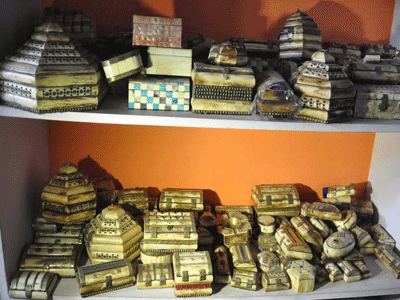Trending
This story is from October 26, 2015
Bone jewellery: Styled & stated
Sambhal, a district in Moradabad division, houses the bone jewellery and artefacts industry which has witnessed a decline in the recent years. We speak to professionals involved to find out more.

Sambhal, a district in Moradabad division, houses the bone jewellery and artefacts industry which has witnessed a decline in the recent years. We speak to professionals involved to find out more.
Since early ages, dressing up has always been an important part of life. Choosing the perfect outfit, applying make-up that highlights our best features and wearing jewellery that complements our overall get-up matters.Although jewellery made of precious metals such as gold and silver has always been popular, semi-precious stones and other raw materials have started gaining popularity recently. Sambhal, a district in Moradabad division, houses a unique industry that deals in making and supplying jewellery made of animal bones. Extremely popular in international markets, the industry has witnessed a decline in the recent years. We speak to professionals who throw further light in the matter.
Speaking on the history of this industry, Kamal Kaushal Varshney, an exporter who has been in the business since 1999, says, "Post-independence, Sambhal had numerous artisans who made combs made of buffalo horns. According to tradition, a group of people gather the raw material from animals who die a natural death across the country and supply it to artisans here. With an evolving market and growing demand, the range of products and raw materials increased. Around the year 1980, artisans started working with buffalo and camel bones." He further said that numerous items were being made, including bangles, bracelets, necklaces, earring and even belts.
Exporters provide the ready products to famed brands across the globe. "Greece, Spain and Italy created the bulk of the demand for bone jewellery items. However, with the recession in Europe the demand has gone down from these countries. The change was observed in the year 2012. Another issue is that China has started importing raw materials from our country itself and is giving us stiff competition. As a result, the remaining market demand is divided between two suppliers," said Varshney. According to him, the only solution for this problem is for the government to completely stop exporting raw material such as bones and horns to other countries.
Agreeing, Mohammed Shaan Khan, a supplier, said, "Basically, the international market is witnessing an overall decline. Exporters are not getting orders due to which they are unable to buy items from us. As a result, many units have already shut down and others are set to follow." Questioned about how artisans are dealing with the situation, he said that most shift to metropolitans or shift out of the country where their craft is appreciated and helps them earn a living. "At the end of the day, everyone needs to provide two square meals for his family and these artisans are no different. I urge to the government to look into the matter and ensure that this imperative part of our tradition does not die," said Shaan.
Speaking on the issue, Kamal said, "Some of our artisans have been a part of this industry since independence era. I provide employment to almost fifty such workers and each of them give stiff competition to the other. However, if we fail to provide them with adequate work or reimbursement they would definitely prefer to change employment." The government needs to wake up and realise their responsibility towards small scale industries such as these or they will be lost forever. Ensuring that professionals have enough work that helps them stay afloat is a responsibility that officials need to take seriously. This is the only way one can ensure that all ties are not cut with the unique bone jewellery industry here.
Since early ages, dressing up has always been an important part of life. Choosing the perfect outfit, applying make-up that highlights our best features and wearing jewellery that complements our overall get-up matters.Although jewellery made of precious metals such as gold and silver has always been popular, semi-precious stones and other raw materials have started gaining popularity recently. Sambhal, a district in Moradabad division, houses a unique industry that deals in making and supplying jewellery made of animal bones. Extremely popular in international markets, the industry has witnessed a decline in the recent years. We speak to professionals who throw further light in the matter.
Speaking on the history of this industry, Kamal Kaushal Varshney, an exporter who has been in the business since 1999, says, "Post-independence, Sambhal had numerous artisans who made combs made of buffalo horns. According to tradition, a group of people gather the raw material from animals who die a natural death across the country and supply it to artisans here. With an evolving market and growing demand, the range of products and raw materials increased. Around the year 1980, artisans started working with buffalo and camel bones." He further said that numerous items were being made, including bangles, bracelets, necklaces, earring and even belts.
Exporters provide the ready products to famed brands across the globe. "Greece, Spain and Italy created the bulk of the demand for bone jewellery items. However, with the recession in Europe the demand has gone down from these countries. The change was observed in the year 2012. Another issue is that China has started importing raw materials from our country itself and is giving us stiff competition. As a result, the remaining market demand is divided between two suppliers," said Varshney. According to him, the only solution for this problem is for the government to completely stop exporting raw material such as bones and horns to other countries.
To this, 36-year-old Mohammed Saleem, who has been a manufacturer for eight years, added, "The major demand is for bone items, including jewellery, boxes and even photo frames. We have around three artisans who work for us. The cost of items varies according to the design and even size of the item, but a popular 6 inch by 3 inch box comes within the range of Rs 250." Although every industry faces ups and downs, the bone jewellery industry has been on a decline for the past three years. "Although I would not call this decline a major hitch, but with inflation the product costs have doubled and are affecting our profits. I hope this phase passes soon," he said.
Agreeing, Mohammed Shaan Khan, a supplier, said, "Basically, the international market is witnessing an overall decline. Exporters are not getting orders due to which they are unable to buy items from us. As a result, many units have already shut down and others are set to follow." Questioned about how artisans are dealing with the situation, he said that most shift to metropolitans or shift out of the country where their craft is appreciated and helps them earn a living. "At the end of the day, everyone needs to provide two square meals for his family and these artisans are no different. I urge to the government to look into the matter and ensure that this imperative part of our tradition does not die," said Shaan.
Speaking on the issue, Kamal said, "Some of our artisans have been a part of this industry since independence era. I provide employment to almost fifty such workers and each of them give stiff competition to the other. However, if we fail to provide them with adequate work or reimbursement they would definitely prefer to change employment." The government needs to wake up and realise their responsibility towards small scale industries such as these or they will be lost forever. Ensuring that professionals have enough work that helps them stay afloat is a responsibility that officials need to take seriously. This is the only way one can ensure that all ties are not cut with the unique bone jewellery industry here.
End of Article
FOLLOW US ON SOCIAL MEDIA









